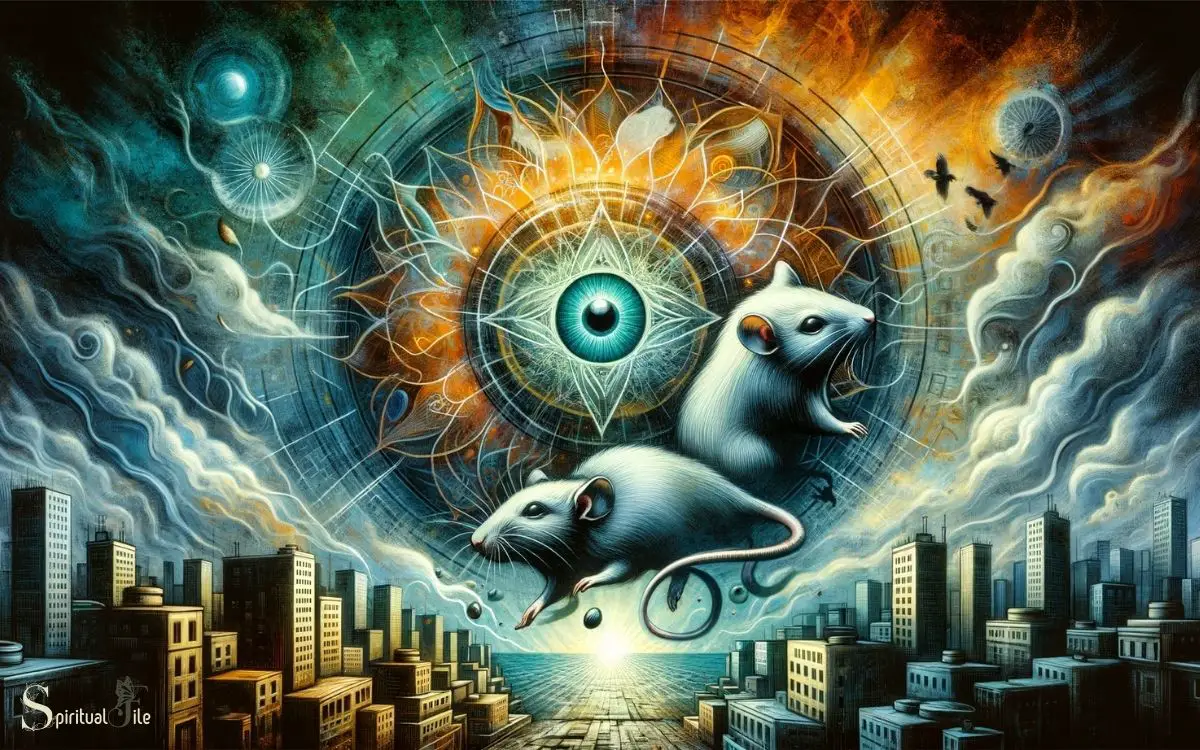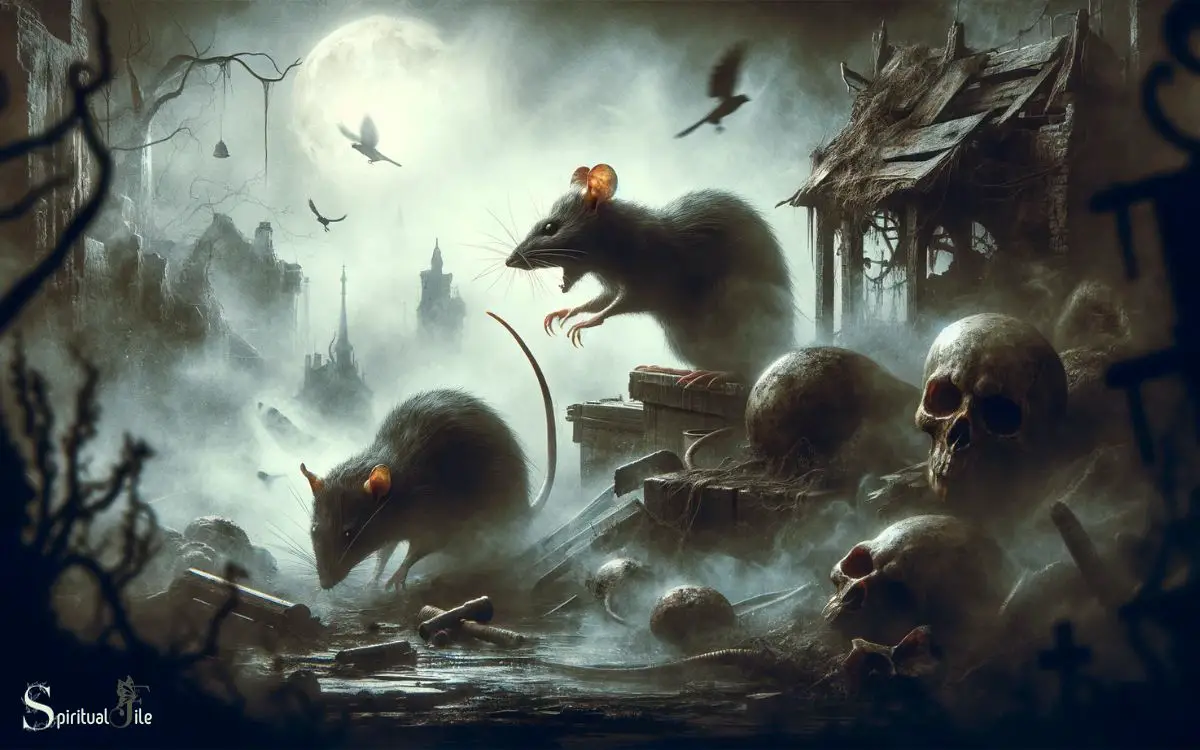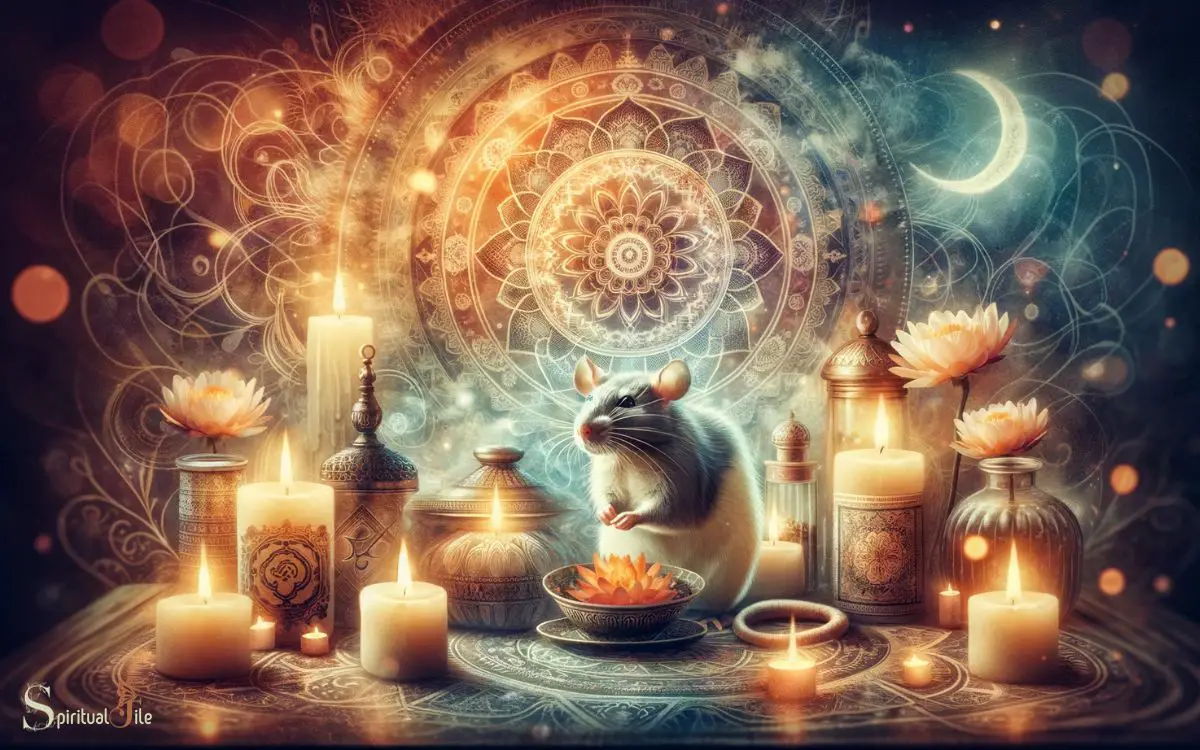What Do Rats Symbolize Spiritually? Explain!
Rats are spiritual symbols with a rich tapestry of meanings, varying from negative connotations such as disease and misfortune to positive aspects like adaptability and intelligence.
They are viewed differently across cultures, with their spiritual significance deeply rooted in local beliefs and traditions.
Rats, in a spiritual context, often represent survival, fertility, and prosperity due to their prolific nature.
However, because of their association with spreading diseases historically, they also symbolize death and the darker aspects of human societies.
- In the Chinese zodiac, the Rat is a sign of intelligence, resourcefulness, and wealth.
- In Hinduism, the deity Ganesha is often depicted with a rat at his feet, symbolizing the ability to overcome obstacles.
- In Western cultures, rats can represent betrayal or stealth, as they are often seen as creatures of the night.
By examining these different interpretations, one can understand the complex symbolism that rats hold in spiritual realms.
Recognizing the dual nature of rat symbolism, it is clear that these creatures embody the delicate balance between prosperity and destruction, guiding humans in their quest for spiritual growth and awareness.

Key Takeaway
Spiritual Symbolisms of Rats Across Cultures – Uncovering Meanings
| Culture/Religion | Symbolism of Rats | Positive Connotations | Negative Connotations |
|---|---|---|---|
| Hinduism | Vehicle of Lord Ganesha | Wisdom, prudence, ability to overcome odds | None explicitly tied to spiritual belief |
| Chinese Zodiac | One of the 12 zodiac animals | Intelligence, adaptability, charisma | Trickery, manipulation |
| Western | Often associated with dark forces | Survivorship, resourcefulness | Disease, filth, betrayal |
| Buddhism | Earthly desires and temptations | Fertility, wealth | Greed, desire, ignorance |
| Native American | Trickster spirit | Cleverness, shrewdness | Deceit, untrustworthiness |
Rats as Symbols of Disease and Misfortune

Rats are often viewed as symbols of disease and misfortune due to their association with unsanitary conditions and the spread of illness.
This perception has been deeply ingrained in various cultures and has contributed to the negative symbolism associated with rats.
In many spiritual and cultural contexts, rats are seen as harbingers of pestilence and are linked to the spread of plagues and diseases.
The historical role of rats in transmitting deadly illnesses such as the bubonic plague has further solidified this negative symbolism.
Additionally, their presence in unsanitary environments reinforces the association with filth and misfortune.
As a result, rats have come to symbolize not only physical illness but also spiritual and emotional afflictions in the collective consciousness of many societies.
Rats as Agents of Change and Adaptability

In the context of spiritual symbolism, rats serve as agents of change and adaptability, embodying the capacity to navigate and thrive in ever-changing environments, despite their association with disease and misfortune.
Rats are often viewed as resilient creatures that can adapt to various circumstances, making them powerful symbols of adaptability in the face of adversity.
Their ability to survive and even thrive in challenging conditions highlights their capacity for change and the importance of flexibility in spiritual growth. Rats symbolize the need to embrace change and to be resourceful in navigating life’s transitions.
Their presence in spiritual symbolism can be a reminder of the importance of adaptability and the potential for positive transformation, even in the most challenging of circumstances.
Rats in Mythology and Folklore

Throughout various cultures and traditions, rats have been featured prominently in mythology and folklore, often representing a diverse range of symbolic meanings and characteristics.
In various mythological and folkloric traditions, rats have been associated with:
- Resourcefulness: In Chinese folklore, the rat is the first animal of the Chinese zodiac and is associated with quick thinking and resourcefulness.
- Trickery: In European folklore, rats are often depicted as cunning and sly creatures, known for their ability to outsmart humans and other animals.
- Fertility and Prosperity: In Hindu mythology, the rat is associated with the god Ganesh and is seen as a symbol of fertility and prosperity.
- Disease and Death: In some cultures, rats are associated with disease and death, often depicted as carriers of plague and destruction.
These diverse representations in mythology and folklore showcase the complex and multifaceted nature of the rat symbol.
Rats as Representations of Resourcefulness

Representing quick thinking and adaptability, rats have long been regarded as symbols of resourcefulness in various cultural and mythological contexts.
Across different civilizations, rats are admired for their ability to survive and thrive in challenging environments, often utilizing their intelligence to find food and shelter.
This resourcefulness has led to rats being associated with traits such as cunning problem-solving, adaptability to changing circumstances, and an agile approach to overcoming obstacles.
In folklore and literature, rats are frequently depicted as clever and quick-witted creatures, using their ingenuity to outsmart larger and more powerful adversaries.
The symbolism of resourcefulness embodied by rats serves as a reminder of the value of flexibility and creative thinking in navigating life’s challenges.
Understanding the significance of rats as representations of resourcefulness provides insight into their spiritual symbolism and their role in cultural beliefs and traditions.
– Are there any spiritual symbols that are commonly associated with both rats and goats?
Yes, there are spiritual symbols commonly associated with both rats and goats. In the spiritual symbolism of goats, goats are often seen as representing independence and vitality. In some cultures, rats are also associated with resourcefulness and adaptability, making them spiritual symbols of ingenuity.
Rats in Spiritual Traditions and Beliefs

Rats have been symbolically significant in spiritual traditions and beliefs, embodying various meanings and interpretations across different cultures and historical contexts.
In various spiritual traditions, rats are often associated with both positive and negative symbolism:
- Positive Symbolism: In Hinduism, the rat is associated with the god Ganesh, representing wisdom, intelligence, and the ability to overcome obstacles.
- Negative Symbolism: In Christian traditions, rats are often seen as symbols of filth, destruction, and uncleanliness, representing sin and moral decay.
- Symbol of Fertility: In Chinese folklore, rats symbolize fertility and abundance, and they are often associated with the zodiac sign and considered as a symbol of wealth and surplus.
- Cunning and Adaptability: In Native American traditions, rats are seen as symbols of adaptability, survival, and resourcefulness due to their ability to thrive in various environments.
Conclusion
Rats hold diverse spiritual symbolism across various cultures and traditions. Their representation ranges from disease and misfortune to adaptability and resourcefulness. Mythology and folklore have also contributed to the multifaceted symbolism of rats.
In spiritual beliefs, rats are often associated with resourcefulness and survival. Their presence in spiritual traditions reflects the complexity of their symbolism and the significance they hold in the spiritual realm.
As a result, rats are seen as powerful symbols in the spiritual world.






